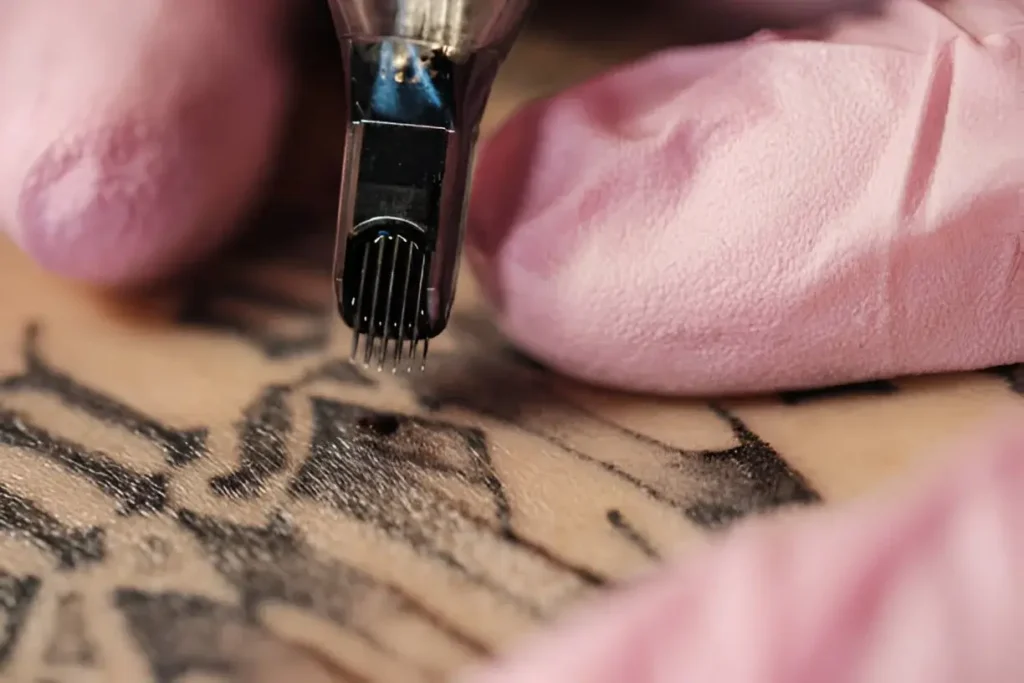Millions of people ink their skin with tattoos worldwide, making them a cultural phenomenon. Tattoo design can be as complex or as simple as you like and can be used to express your identity and personal style. There are concerns regarding the long-term health effects of tattoos, particularly cancer risk, as the trend grows. Many people wonder: Do Tattoos Cause Cancer? As this trend continues, however, concerns have arisen regarding tattoo ink ingredients and speculation that tattoos might cause cancer. We’ll explore the science of tattoo safety, debunk myths, and provide the facts you need.
1. Understanding Tattoo Inks
The ingredients in tattoo ink are important to understanding possible cancer risks. Ink for tattoos is normally composed of pigments suspended in a carrier solution. Inorganic or organic compounds can be used to make these pigments. Tattoo ink contains the following ingredients:
- Heavy metals like mercury, lead, cadmium, and chromium.
- Pigments are derived from carbon, plastics, or even metals.
- Preservatives to stop bacterial contamination.
It is important to note that ink quality and type can vary considerably by manufacturer and that while the U.S. Federal Drug Administration (FDA) has begun regulating tattoo inks, there is still no comprehensive regulatory framework for the industry. There are concerns about the long-term health effects of tattoo inks, because they may contain unknown or possibly harmful ingredients.
Can Tattoo Ink Penetrate Deep Enough to Cause Health Issues?
A tattoo is a procedure in which ink is injected into the dermis, the layer beneath the epidermis, to produce a permanent mark. This layer is permanently marked with ink once it reaches it. How do ink particles age over time?

The migration of some ink particles through the body has been demonstrated by studies. These particles can be collected by lymph nodes, which are small glands that help fight infections. Ink, although recognized as foreign, isn’t normally a major problem for the immune system. It is still debated, however, whether tattoo ink collection in lymph nodes could cause long-term health problems.
What Does Research Say About Tattoos and Cancer Risk?
According to current research, tattoos may cause cancer, but here’s what we know:
- No definitive link: According to current studies, tattoos do not directly cause cancer. Occasionally, cancers like melanoma and squamous cell carcinoma develop on tattooed skin, but those cases are rare and often coincidental.
- Lymph node complications: Some studies have found cancerous lymph nodes in tattoo ink. There is no evidence that tattoos cause cancer, however.
The evidence so far suggests that tattoo-related cancer risks are extremely low, despite ongoing research.
Tattoo Inks and Carcinogenic Compounds
Tattoo ink contains carcinogens, which is a concern for many. Carcinogens are substances that can cause cancer. Compounds found in tattoo ink include:
- Polycyclic aromatic hydrocarbons (PAHs): Black ink contains these carcinogens, which can be released over time when the ink is broken down by sunlight.
- Azo dyes: The dyes used in coloured inks (especially red) can degrade into potentially hazardous substances.
Getting tattooed ink is generally not harmful even though these substances may sound alarming. Those who use ink that breaks down under UV exposure and releases harmful compounds into the body are at risk of health problems.
Do Certain Tattoo Colors Pose a Higher Cancer Risk?
Yes, specific tattoo colours may come with higher risks due to their chemical composition. For example,
- Allergic reactions come with red ink tattoos and contain pigments that degrade into carcinogenic compounds.
- Using black ink exposes the user to PAHs, as it is composed of carbon-based compounds.
Ink colors other than black and red have not been definitively linked to cancer. However, it’s wise to be careful when it comes to tattoo ink colours.
The Role of Sun Exposure on Tattooed Skin
Skin cancer is associated with sun exposure. Especially dark-coloured tattoos absorb more UV rays, which could be the reason of skin damage. Some concerns include:
- Sunburn on tattoos: Skin cancer is more likely to develop if your tattoo gets sunburned since the skin is already weakened. Use sunscreen to protect your tattooed skin from UV rays.
- Tattoos acting as magnifiers: The dark pigment of tattoos may absorb more sunlight, a reason for possible mutations in the skin’s cells. It’s worth noting that this is more of a concern for sunburn than cancer, but it still deserves attention.
Are There Cases of Cancer Found Directly in Tattoos?
Occasionally, tattooed areas are reported to have melanoma and non-melanoma skin cancers. There are rare cases in which cancer has been caused by a tattoo or developed independently. It may be more difficult for dermatologists to detect early signs of skin cancer in individuals who are heavily tattooed.

Non-Cancerous Health Risks Linked to Tattoos
Tattoos are not the actual reason of cancer, but here are some risks that come with tattoos:
- Infections: Infections can happen by using unsterilized equipment or poor aftercare.
- Allergic reactions: Because of sensitive skin tattoo ink will be the reason for allergic reactions in some people, especially when the pigments are red or yellow.
- Granulomas and keloids: Once the healing process begins, the skin may develop lumps or raised scars due to tattoo ink.
Although tattooed areas can experience chronic inflammation, there is no indication that it may eventually lead to cancer.
Common Myths About Tattoos and Cancer
Let’s clear up some of the most common myths that surround the market:
- All tattoos cause cancer: False. There is no solid evidence that clearly says that tattoos cause cancer.
- The larger the tattoo, the higher the cancer risk: False. Cancer risk is not correlated with size, but other health risks may be affected by size, such as infection risks.
- Colored inks are more dangerous than black inks: Partially true. Specific tattoo ink colors like red or yellow come with more risks, but black ink can also contain harmful compounds.
Safety Tips for Reducing Risks When Getting a Tattoo
Important key steps that can help you to reduce your risk of getting a tattoo:
- Pick an experienced tattoo artist: Inks of high quality should be used and proper sterilization techniques should be followed.
- Ask about the ink: Check to see if the inks have been approved by the FDA or are chemical-free.
- Patch test: Skin allergies or sensitive skin should be tested with a patch test.
- Use sunscreen: Make sure that broad-spectrum sunscreen is applied to your tattooed skin to keep it protected from UV rays.
Future Research and the Regulation of Tattoo Inks
The long-term health effects of tattoos have been debated for centuries although they have been around for centuries. It will take more research to determine whether tattooed ink particles will be the reason of serious health problems like cancer. Fortunately, the tattoo industry is evolving and introducing safer ink formulations.
Tattoo inks are also under increasing regulatory pressure worldwide to ensure they are only made from safe, non-toxic pigments. Also, is the use of Aquaphor on tattoo skin good?
Final Thoughts
So, do tattoos cause cancer? On current research, the answer is no—tattoos do not directly cause cancer. But, there are some risks associated with tattoo inks, especially concerning the ingredients. You need to be aware of these risks and taking precautions to avoid them is important.
Any modification should be done with care and safety in mind. Artist must be reputable, stay informed about the inks used, and avoid sun exposure for the next few months after getting their tattoos. Taking these steps will help you enjoy your tattoo without worrying.


6 thoughts on “Do Tattoos Cause Cancer?”